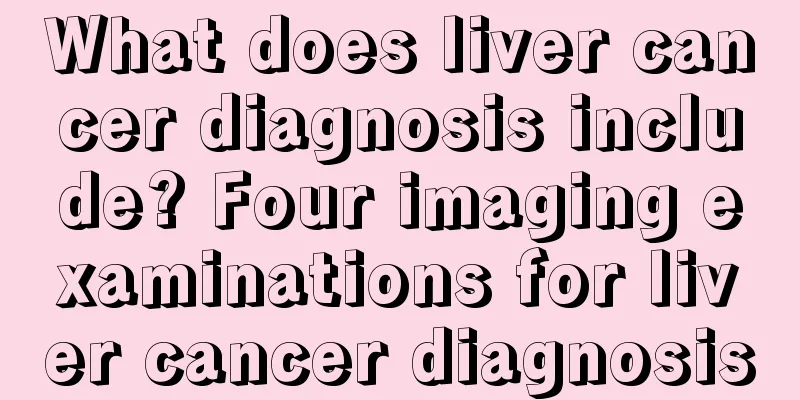What does liver cancer diagnosis include? Four imaging examinations for liver cancer diagnosis

|
The diagnosis of liver cancer must use some detection methods. There are many ways to diagnose liver cancer clinically, which are divided into imaging examinations and biochemical tests. Among them, the following detection methods cannot be ignored in the diagnosis of liver cancer: ultrasound examination, CT, pET-CT, and MRI examination. Imaging tests for liver cancer 1. Ultrasound examination: B-ultrasound examination is economical and convenient. It can show the size, shape and location of the tumor, and the diagnostic accuracy rate is about 90%. The detection rate of liver lesions is also relatively high. This is one of the examination methods for early liver cancer. Generally speaking, it takes about 4 to 6 months for liver cancer to grow from 1 cm to 3 cm. Therefore, if liver cancer is not found in the first B-ultrasound liver cancer examination, it should be taken again after 4 to 6 months. The liver cancer should still be below 3 cm, and the treatment effect should be good. 2. CT: CT is an extremely important method for liver cancer examination, and it is widely used in China. However, when the diameter of liver cancer is less than 2 cm or the density is close to that of normal liver, it is difficult to show it on CT. Liver cancer is diffuse and difficult to detect on CT; it is difficult to distinguish between primary and secondary liver cancer. 3. pET-CT: pET-CT is one of the methods for early liver cancer examination. Patients with hepatitis B and other conditions may consider the examination. pET-CT is a functional molecular imaging system that integrates pET and CT. It can not only reflect the biochemical metabolic information of liver space-occupying tissues through pET functional imaging, but also accurately locate the lesions through CT morphological imaging. At the same time, whole-body scanning can understand the overall condition and evaluate the metastasis, so as to achieve the purpose of early detection of lesions. At the same time, it can understand the size and metabolic changes of tumors before and after treatment. 4. Magnetic resonance imaging MRI is a rapidly developing examination method in recent years. In the past, MRI was not as ideal as CT examination. Now, with the continuous development of MRI technology, the scanning time is getting faster and faster, and the resolution is getting higher and higher. It can also make a relatively accurate judgment for some small lesions in the liver. Now MRI also plays a big role in the examination of liver cancer. What does the diagnosis of liver cancer include? Be sure to have a careful physical examination: Some liver cancers occur on the basis of liver cirrhosis. Therefore, these liver cancer patients may have positive signs such as mild jaundice of the sclera, liver palms, and spider nevi. Patients with advanced liver cancer may have enlarged lymph nodes, palpable enlarged liver under the ribs and xiphoid process, shifting dullness on percussion in the abdomen of some patients, and mild edema in both lower limbs. Patients with benign lesions lack the above signs. |
Recommend
How to exercise for sacral pain
Sacral pain is a relatively common orthopedic dis...
How to treat uremia
Life is like a five-flavor jar, which often bring...
I feel like vomiting when I smell the fragrance
Every girl loves beauty very much and often spray...
Can surgery be performed on tophi
Gout is a relatively common disease at present. M...
How to treat anal fistula in the early stage
Anal fistula is actually a disease caused by peri...
Will I feel pain before dying from advanced lymphoma?
Malignant lymphoma is a large class of tumors wit...
Is it better to take vitamin B6 before or after meals?
Vitamin B6 is an essential trace element in the b...
Prostate cancer and diet therapy: Eating these foods regularly is good for prostate cancer
Prostate cancer is a common malignant tumor in el...
Why is it easy to grow fat on the waist
A woman's abdomen is an area where fat easily...
What are the symptoms of advanced liver cancer
The patient is in the late stage of liver cancer....
Summer vacation schedule for middle school students
High school is a very important period for studen...
Who are not suitable for sweat steaming
It may bring us many benefits, but sweat steaming...
What to do if skin allergies cause red spots
When human skin touches something highly irritati...
Skin itching without symptoms
In life, many people often feel itchy skin. Most ...
How to stop bleeding from internal hemorrhoids, four methods to help you
Bleeding from internal hemorrhoids can reflect ma...









